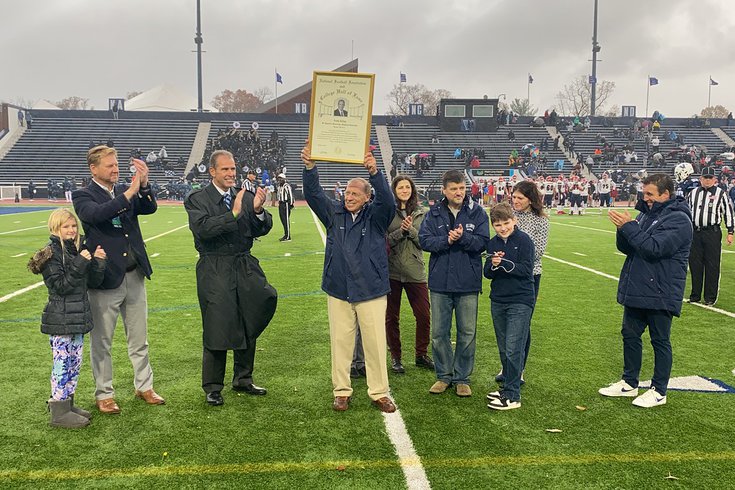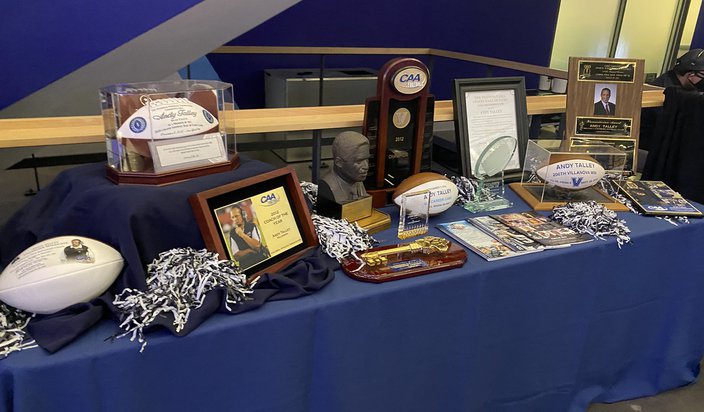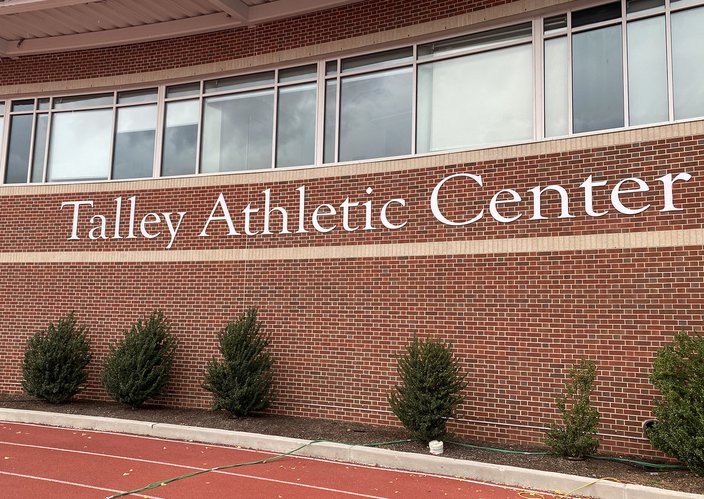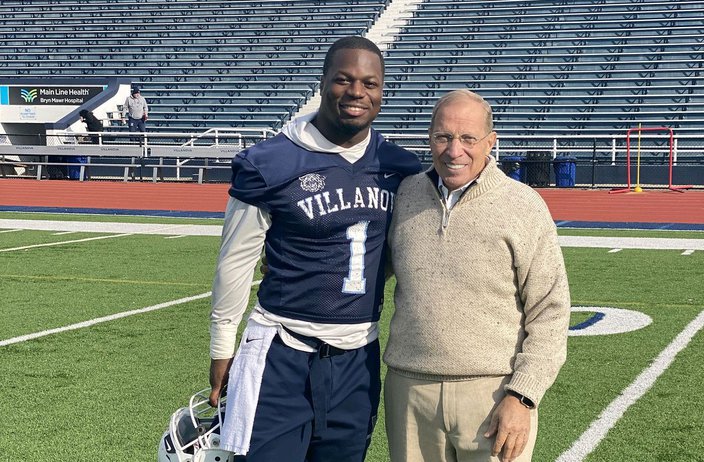
November 18, 2021
 Courtesy/Andy Talley
Courtesy/Andy Talley
Former Villanova football coach Andy Talley used to sneak into games. Now, he gets honored at them.
It was an annual fall ritual. Little Andy Talley and his buddies would crouch down as they neared the cyclone fence that encircled Villanova Stadium. Then, one by one, they would take turns holding the fence up as the others crawled underneath.
That’s what you did when you grew up on blue-collar Martin Avenue, in the backwater of Bryn Mawr, Delaware County, to sneak into Villanova football games in the 1950s. Talley’s father drove a trash truck and his mother cleaned houses for a living.
It’s one of Talley’s earliest vivid memories of watching the Wildcats, before he took over as head coach at Villanova in 1985 resurrecting the program with former Villanova athletic director Ted Aceto.
On December 7, at the ARIA Resort & Casino in Las Vegas, Nevada, Talley will have the honor of being the first Villanova player or coach to be inducted into the College Football Hall of Fame.
Talley, 78, is actually part of the 2020 class that also included among others, former Eagle Keith Byars (running back, Ohio State 1982-85), NFL Hall of Famer Eric Dickerson (running back, Southern Methodist 1979-82), the late Steve McNair (quarterback, Alcorn State 1991-94), Lomas Brown (offensive tackle, Florida 1981-84), Eric Crouch (quarterback, Nebraska 1998-2001) and Jumbo Elliott (offensive tackle, Michigan 1984-87).
Because of the COVID-19 pandemic, Talley’s induction was postponed a year and will be inducted along with the 2021 class, which includes former Eagle Darren Sproles (Kansas State) and former Dallas Cowboys’ quarterback Tony Romo (Eastern Illinois).
Talley is Villanova’s all-time winningest coach, amassing a 229–137–1 record over a 32-year span (1985-2016), including the Wildcats’ lone national title in football, the FCS National Championship in 2009. He’s a two-time winner of the American Football Coaches Association Coach of the Year award (1997, 2009), and an Eddie Robinson Award winner (1997).
Under Talley, Villanova made a total of 12 FCS playoff appearances.
The Villanova football program had grown dormant before Talley arrived. The school officially dropped football on April 14, 1981, due to “weak attendance and monetary reasons,” cited by the Villanova Board of Trustees after a 6-5 season.
Weight from alumni and student population brought it back in April 1984. One of their first jobs was to find a head coach that could deal with a bare-bones budget in what at that time was a dilapidated stadium. Furthermore, it meant rekindling interest under the heavy cloud of a national-level basketball program that would go on to win its first national championship in 1985 under kinetic coach Rollie Massimino.
Talley literally built the program from scratch. The school was able to support 63 scholarships and Talley, then 41, had a staff of under-30-something coaches who were paid very little.
Still, he built a winner.
The Wildcats had immediate success, which was greeted by growing crowds to a fall sport, then there was basketball season.
Talley was first notified he was inducted through a package in the spring of 2019 that contained a football. Talley thought it was a nice gift from the National Football Foundation. But when Talley opened the package and began reading the inscription on the football, it read in part … “Of the 2.8 million people who have played football, only 1,000 or so have gone into the College Football Hall of Fame as a player, and only 217 coaches. Welcome, you are now one of our members.”
 Courtesy/Andy Talley
Courtesy/Andy TalleyA look at some of Andy Talley's career achievements.
After a two-year waiting period, Talley was a first-ballot College Football Hall of Famer.
Not bad for the son of a truck driver who once snuck into Villanova football games in the 1950s.
“I never dreamed of any of this,” said Talley, born Andrew Talarico, a Haverford High School graduate. “I paid my dues, and traveled around coaching. The Villanova job probably should have gone to a Villanova grad. There were five other head coaches, plus me, who were going for the job.
“I did my homework and I knew that hiring committee. There were a lot of questions, like how were we going to resurrect this thing from scratch, how were going to get football guys to come to this school, how were we going to get young college coaches who were GAs everywhere and have no real experience? How were we going to kick this thing off, and bounce them into Division III after not even being a Division III team?
“Our third year, we played Holy Cross, which was No. 1 in the country, and in our fourth year, we opened up with Wake Forest, at Villanova. I was really aggressive and I wanted to hit every single thing they needed to know.”
Talley went home after the interview, and the next morning, at 2 a.m., Talley was called by Aceto. It’s never good when anyone gets a call at 2 in the morning.
But Talley got up, put his clothes on and drove to Villanova and signed a contract for $45,000 a year in 1984. By the time he left, he was compensated considerably more.
“I never thought I would be in any hall of fame,” said Talley, who still resides in Bryn Mawr and is now in six halls of fame. “My dad (Serafino) died when I was 20 in a car accident, so he never got to see me coach. My mother (Ann Talley), God love her, she passed away after my first year at Villanova. She worked for the Sisters of Mercy at Our Mother of Good Counsel parish, in Bryn Mawr, so she was a diehard Catholic and Villanova was like Rome to her.
“So, when her blue-collar son became coach at Villanova, she spouted that out to the world [laughs].
“I have my parents to thank. And there are so many others, like my coaches. Dave Clawson (Wake Forest’s head coach) was on my staff, Stan Drayton (the associate head coach at Texas), Sam Venuto (long-time offensive coordinator) and, of course, (current Villanova head coach) Mark Ferrante, and obviously the players that we won with.”
 Andy Talley/Courtesy
Andy Talley/CourtesyA look at the Talley Athletic Center on Villanova's campus, which opened in 2016.
What can’t be forgotten in Talley’s Hall of Fame induction is a personal Hall of Fame of saving the lives of nearly 1,000 people through his Andy Talley Bone Marrow Foundation.
For 13 years now, the foundation has been putting college students on the “Be The Match” registry through a program called “Get in the Game” (GITG). To date, over 120,000 people have been added to the registry. Over 900 of those registrants have gone on to donate stem cells or bone marrow to save a life. A shining example of the program’s success rate is that 1 in every 150 GITG registrants goes on to transplant, compared to the “Be The Match” average of 1 in 430.
“I had no idea how this would grow,” Talley said. “My wife had breast cancer and made it through since I’ve been involved with it. I truly believe it’s a calling. I wanted to do it, and I did it when I was still coaching at Villanova. It took a lot of time away from coaching, and I had the staff that could handle things, Coach Ferrante being a part of it.
“No one in the world does what we do. We’re getting bigger and bigger. We have to raise money and I have to recruit college football team, which is a labor of love. We work with Be the Match, they’re our partners. Getting the Hall of Fame induction is a great thing, because this keeps my name out there and it keeps the foundation out there.
“If I’m calling a coach in Texas, or California, I can tell them, ‘Hey, I’m Andy Talley, I coached at Villanova for a bunch of years,’ and maybe they remember me from being inducted in the hall of fame. That, to me, is important. I’ve never had a coach tell me no. We do all of this through the power of college football.”
 Courtesy/Andy Talley
Courtesy/Andy TalleyVillanova running back Justin Covington and former coach Andy Talley.
Joseph Santoliquito is an award-winning sportswriter based in the Philadelphia area who has been writing for PhillyVoice since its inception in 2015 and is the president of the Boxing Writers Association of America. He can be followed on Twitter here: @JSantoliquito